Updated on November 10th, 2025 by Bob CiuraSpreadsheet data updated daily
Monthly dividend stocks are securities that pay a dividend every month instead of quarterly or annually.
This research report focuses on all 83 individual monthly paying securities. It includes the following resources.
Resource #1: The Monthly Dividend Stock Spreadsheet List

This list contains important metrics, including: dividend yields, payout ratios, dividend growth rates, 52-week highs and lows, and more.
Note: We strive to maintain an accurate list of all monthly dividend payers. There’s no universal source we are aware of for monthly dividend stocks; we curate this list manually. If you know of any stocks that pay monthly dividends that are not on our list, please email [email protected].
Resource #2: The Monthly Dividend Stocks In Focus SeriesThe Monthly Dividend Stocks In Focus series is where we analyze all monthly paying dividend stocks. This resource links to stand-alone analysis on each of these securities.
Resource #3: The 10 Best Monthly Dividend StocksThis research report analyzes the 10 best monthly dividend stocks as ranked by expected total return.
Resource #4: Other Monthly Dividend Stock Research– Monthly dividend stock performance– Why monthly dividends matter– The dangers of investing in monthly dividend stocks– Final thoughts and other income investing resources
The Monthly Dividend Stocks In Focus Series
You can see detailed analysis on the individual monthly dividend securities we cover by clicking the links below:
Agree Realty (ADC)
AGNC Investment (AGNC)
Atrium Mortgage Investment Corporation (AMIVF)
Apple Hospitality REIT, Inc. (APLE)
ARMOUR Residential REIT (ARR)
Banco Bradesco S.A. (BBD)
Diversified Royalty Corp. (BEVFF)
Boston Pizza Royalties Income Fund (BPZZF)
Bridgemarq Real Estate Services (BREUF)
BSR Real Estate Investment Trust (BSRTF)
Canadian Apartment Properties REIT (CDPYF)
Cardinal Energy Ltd. (CRLFF)
ChemTrade Logistics Income Fund (CGIFF)
Choice Properties REIT (PPRQF)
Cross Timbers Royalty Trust (CRT)
CT Real Estate Investment Trust (CTRRF)
Chartwell Retirement Residences (CWSRF)
SmartCentres Real Estate Investment Trust (CWYUF)
Dynacor Group Inc (DNGDF)
Dream Office REIT (DRETF)
Dream Industrial REIT (DREUF)
Dynex Capital (DX)
Ellington Residential Mortgage REIT (EARN)
Ellington Financial (EFC)
EPR Properties (EPR)
Exchange Income (EIFZF)
Extendicare Inc. (EXETF)
Flagship Communities REIT (MHCUF)
First National Financial Corporation (FNLIF)
Freehold Royalties Ltd. (FRHLF)
Firm Capital Property Trust (FRMUF)
Fortitude Gold (FTCO)
Gladstone Capital Corporation (GLAD)
Gladstone Commercial Corporation (GOOD)
Gladstone Investment Corporation (GAIN)
Gladstone Land Corporation (LAND)
Global Water Resources (GWRS)
Granite Real Estate Investment Trust (GRP.U)
Grupo Aval Acciones y Valores S.A. (AVAL)
Healthpeak Properties (DOC)
H&R Real Estate Investment Trust (HRUFF)
Horizon Technology Finance (HRZN)
InPlay Oil Corp. (IPOOF)
Itaú Unibanco (ITUB)
LTC Properties (LTC)
Sienna Senior Living (LWSCF)
Main Street Capital (MAIN)
Mesa Royalty Trust (MTR)
Modiv Inc. (MDV)
Mullen Group Ltd. (MLLGF)
Northland Power Inc. (NPIFF)
NorthWest Healthcare Properties REIT (NWHUF)
Orchid Island Capital (ORC)
Oxford Square Capital (OXSQ)
Permian Basin Royalty Trust (PBT)
Phillips Edison & Company (PECO)
Pennant Park Floating Rate (PFLT)
Peyto Exploration & Development Corp. (PEYUF)
Pine Cliff Energy Ltd. (PIFYF)
Primaris REIT (PMREF)
Paramount Resources Ltd. (PRMRF)
PermRock Royalty Trust (PRT)
Prospect Capital Corporation (PSEC)
Petrus Resources Ltd. (PTRUF)
Permianville Royalty Trust (PVL)
Pizza Pizza Royalty Corp. (PZRIF)
Realty Income (O)
RioCan Real Estate Investment Trust (RIOCF)
Richards Packaging Income Fund (RPKIF)
Sabine Royalty Trust (SBR)
Stellus Capital Investment Corp. (SCM)
Savaria Corp. (SISXF)
San Juan Basin Royalty Trust (SJT)
Sir Royalty Income Fund (SIRZF)
SL Green Realty Corp. (SLG)
Slate Grocery REIT (SRRTF)
Stag Industrial (STAG)
Surge Energy Inc. (ZPTAF)
Timbercreek Financial Corp. (TBCRF)
Tamarack Valley Energy (TNEYF)
U.S. Global Investors (GROW)
Whitecap Resources Inc. (WCPRF)
Whitestone REIT (WSR)
The 10 Best Monthly Dividend Stocks
This research report examines the 10 monthly dividend stocks from our Sure Analysis Research Database with the highest 5-year forward expected total returns.
We currently cover almost all monthly dividend stocks every quarter in the Sure Analysis Research Database.
Use the table below to quickly jump to analysis on any of the top 10 best monthly dividend stocks as ranked by expected total returns.
Table of Contents
You can instantly jump to any specific section of the article by using the links below:
Monthly Dividend Stock #10: ARMOUR Residential REIT (ARR)
5-Year Expected Total Return: 11.6%
Dividend Yield: 17.0%
ARMOUR Residential invests in residential mortgage-backed securities that include U.S. Government-sponsored entities (GSE) such as Fannie Mae and Freddie Mac.
It also includes Ginnie Mae, the Government National Mortgage Administration’s issued or guaranteed securities backed by fixed-rate, hybrid adjustable-rate, and adjustable-rate home loans.
Unsecured notes and bonds issued by the GSE and the US Treasury, money market instruments, and non-GSE or government agency-backed securities are examples of other types of investments.
On July 23, 2025, ARMOUR Residential REIT, Inc. reported its financial results for the second quarter of 2025. ARMOUR Residential REIT, Inc. reported a GAAP net loss of $78.6 million, or $0.94 per common share, for Q2 2025, compared to a net income of $24.3 million, or $0.32 per share, in Q1 2025.
Net interest income was $33.1 million, down from $36.3 million in the prior quarter, with an economic net interest spread of 1.82%. Distributable Earnings available to common stockholders were $64.9 million, or $0.77 per share, slightly up from $64.6 million, or $0.86 per share, in Q1.
The company raised $104.6 million by issuing 6,303,710 common shares and paid $0.72 per share in dividends for the quarter. Book value per common share decreased to $16.90 from $18.59 at March 31, 2025, resulting in a total economic return of -5.22%.
The portfolio totaled $15.4 billion, primarily Agency MBS at 94.1%, with a debt-to-equity ratio of 7.72:1 and liquidity of $772.9 million.
Click here to download our most recent Sure Analysis report on ARMOUR Residential REIT Inc (ARR) (preview of page 1 of 3 shown below):
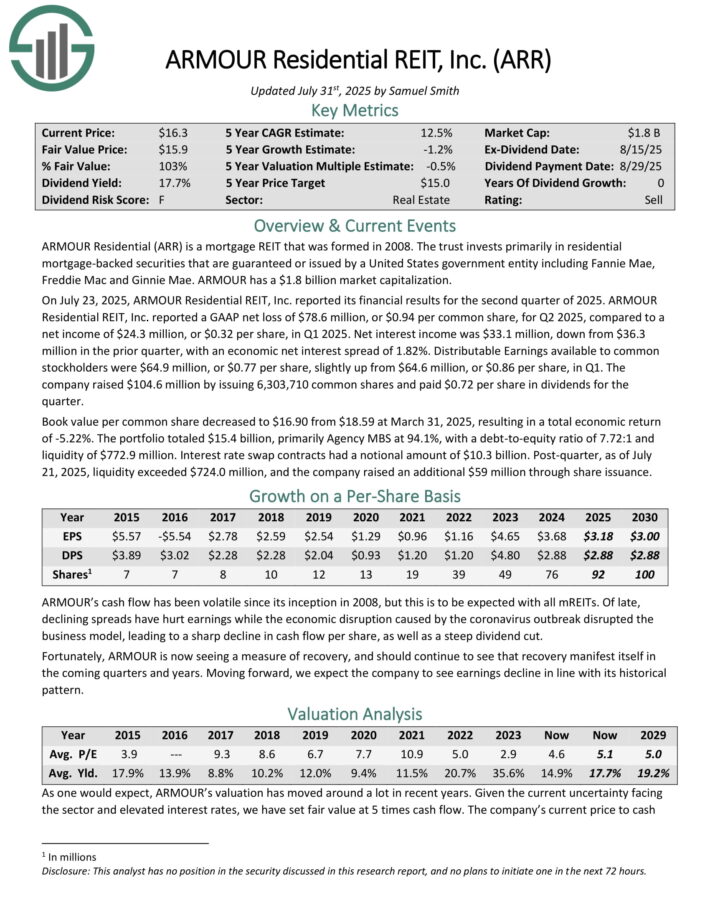
Monthly Dividend Stock #9: Orchid Island Capital (ORC)
5-Year Expected Total Return: 11.8%
Dividend Yield: 19.4%
Orchid Island Capital is a mortgage REIT that is externally managed by Bimini Advisors LLC and focuses on investing in residential mortgage-backed securities (RMBS), including pass-through and structured agency RMBSs.
These financial instruments generate cash flow based on residential loans such as mortgages, subprime, and home-equity loans.
On July 24, 2025, Orchid Island Capital, Inc. reported its financial results for the second quarter of 2025. The company recorded a net loss of $33.6 million, or $0.29 per common share, driven by net interest income of $23.2 million, total expenses of $5.0 million, and net realized and unrealized losses of $51.7 million on RMBS and derivatives.
Dividends declared and paid were $0.36 per common share, with book value per share at $7.21 by June 30, 2025, reflecting a total return of (4.66)%.
Liquidity remained strong at $492.5 million, comprising cash and unpledged securities, representing 54% of stockholders’ equity, with borrowing capacity exceeding $6.7 billion across 24 lenders.
Click here to download our most recent Sure Analysis report on Orchid Island Capital, Inc. (ORC) (preview of page 1 of 3 shown below):

Monthly Dividend Stock #8: PennantPark Floating Rate Capital (PFLT)
5-Year Expected Total Return: 12.1%
Dividend Yield: 13.3%
PennantPark Floating Rate Capital Ltd. is a business development company that seeks to make secondary direct, debt, equity, and loan investments.
The fund also aims to invest through floating rate loans in private or thinly traded or small market-cap, public middle market companies, equity securities, preferred stock, common stock, warrants or options received in connection with debt investments or through direct investments.
On August 11, 2025, PennantPark Floating Rate Capital reported results for the third fiscal quarter ended June 30, 2025, highlighting stable income generation and improved balance sheet flexibility.
The company posted GAAP net investment income of $0.25 per share, with core net investment income of $0.27 per share when excluding one-time items, comfortably covering its dividend.
Management enhanced liquidity by amending its revolving credit facility, lowering the interest rate to SOFR plus 200 basis points from SOFR plus 225, extending both the reinvestment period and final maturity by one year, and raising the first-lien advance rate to 72.5%.
These changes provide greater financing efficiency and room for future portfolio growth. Credit quality remained strong, with the weighted average leverage ratio of portfolio companies at 4.3 times debt-to-EBITDA and an interest coverage ratio of 2.5 times.
New platform investments during the quarter reflected even more conservative levels, averaging 3.8 times debt-to-EBITDA and 2.6 times interest coverage. The portfolio’s weighted average loan-to-value ratio was 46%, and its yield to maturity stood at 10.3%.
Nonaccruals were minimal at just 1% of cost and 0.5% of fair value, underscoring disciplined underwriting. PFLT also raised $32 million through its at-the-market equity program by issuing 2.8 million shares at an average price of $11.31 per share, strengthening capital resources.
In addition, the company and its joint venture, PSSL II, committed $200 million of equity and secured $300 million in financing, creating a $500 million vehicle focused on middle-market senior secured loans.
Click here to download our most recent Sure Analysis report on PFLT (preview of page 1 of 3 shown below):
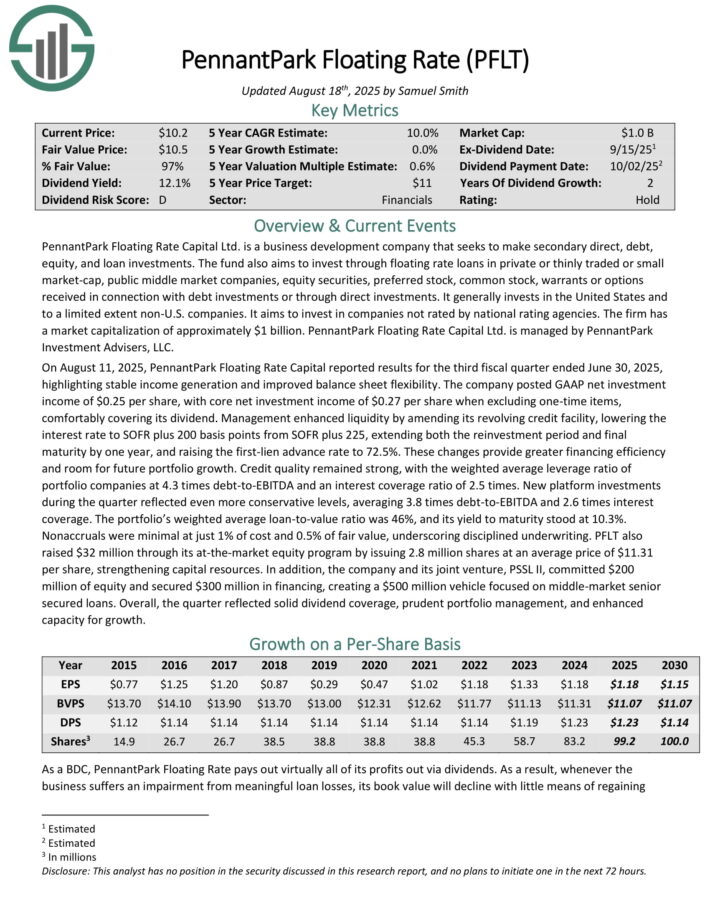
Monthly Dividend Stock #7: BSR Real Estate Investment Trust (BSRTF)
5-Year Expected Total Return: 12.2%
Dividend Yield: 4.9%
BSR Real Estate Investment Trust was formed in 2012 when it was formally established as a REIT in 2012.
Itowns and manages more than two dozen garden-style multi-family communities totaling 6,802 units. The properties are suburban class A and class B apartments that are strategically positioned in demographically and economically thriving Sunbelt cities.
Almost all of BSRTF’s units are located in Dallas, Houston, Austin, and Oklahoma City, respectively. The fund’s strategy is to concentrate in markets where the annual rent as a percentage of median income is low.
This should translate into higher occupancy over time. The latest data demonstrates that annual rent as a percentage of median household income nationally is 26.4%. In BSRTF’s markets, this ranges from as low as 17.8% in Oklahoma City to a still affordable ratio of just 21.2% in Dallas.
On August 6th, BSRTF shared its financial results for the second quarter ending June 30th, 2025. The company’s total revenue dropped by 20.2% over the year-ago period to $33.7 million during the quarter.
This was mostly due to the two-part $618.5 million sale of properties to AvalonBay completed in Q1 and Q2 2025.
Backing this out, the same community property revenue decreased by 0.2% year-over-year to $26.6 million in the quarter.
BSRTF’s AFFO per unit decreased by 20.8% over the year-ago period to $0.19 for the quarter. The reduction in FFO from divestitures led to this drop in AFFO per share during the quarter.
BSRTF announced that it acquired The Ownsby in the Dallas-Fort Worth MSA for $87.5 million. This 368 apartment unit location ranges from one to three-bedroom suites in the fast-growing Celina, Texas market (the fastest growing city in the country in 2023). The property amenities include a resort-style pool, golf simulator, and pet spa.
Click here to download our most recent Sure Analysis report on BSRTF (preview of page 1 of 3 shown below):
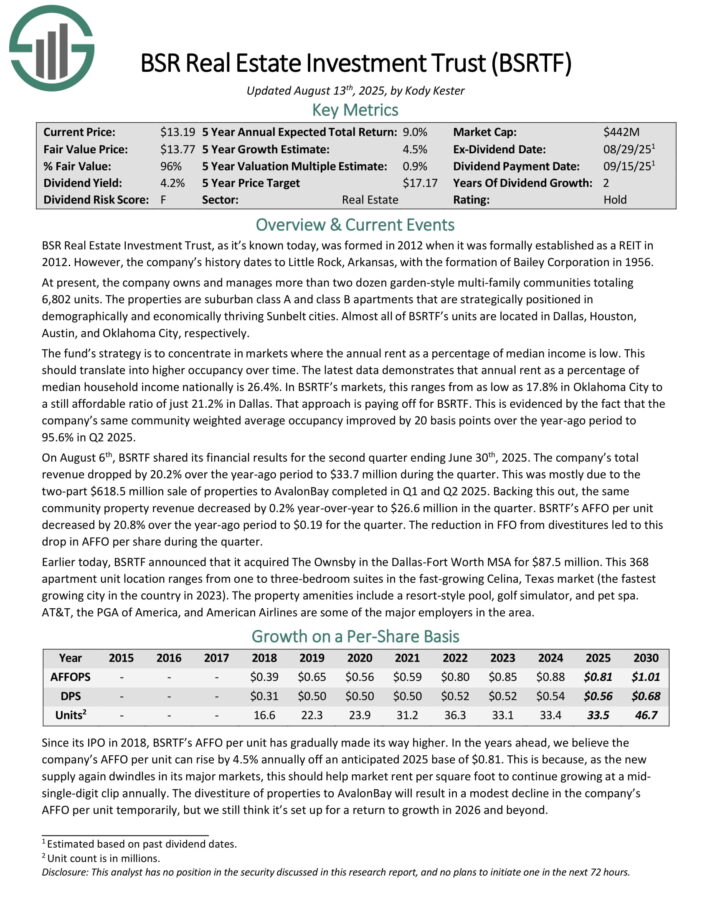
Monthly Dividend Stock #6: Prospect Capital (PSEC)
5-Year Expected Total Return: 12.5%
Dividend Yield: 19.5%
Prospect Capital Corporation is a Business Development Company, or BDC, that provides private debt and private equity to middle–market companies in the U.S.
The company focuses on direct lending to owner–operated companies, as well as sponsor–backed transactions. Prospect invests primarily in first and second lien senior loans and mezzanine debt, with occasional equity investments.
Prospect posted fourth quarter and full-year results on August 26th, 2025, and results were weak once again as the company continues to struggle. Net interest income for the quarter was 17 cents per share. NII was down from 25 cents from the same period a year ago. Total revenue plummeted 21% year-over-year to $167 million.
Total originations were $271 million, up from $196 million in the prior quarter. Total repayments and sales were $445 million, up from just $192 million in Q3. Net originations, then, fell from $4 million in Q3 to -$175 million in the final quarter of the year, shrinking the company’s portfolio to $6.67 billion. That’s down from $7.72 billion a year ago.
Annualized current yield for all investments rose to 9.6% from 9.2% in Q3, but lower from 9.8% a year ago.
Click here to download our most recent Sure Analysis report on PSEC (preview of page 1 of 3 shown below):
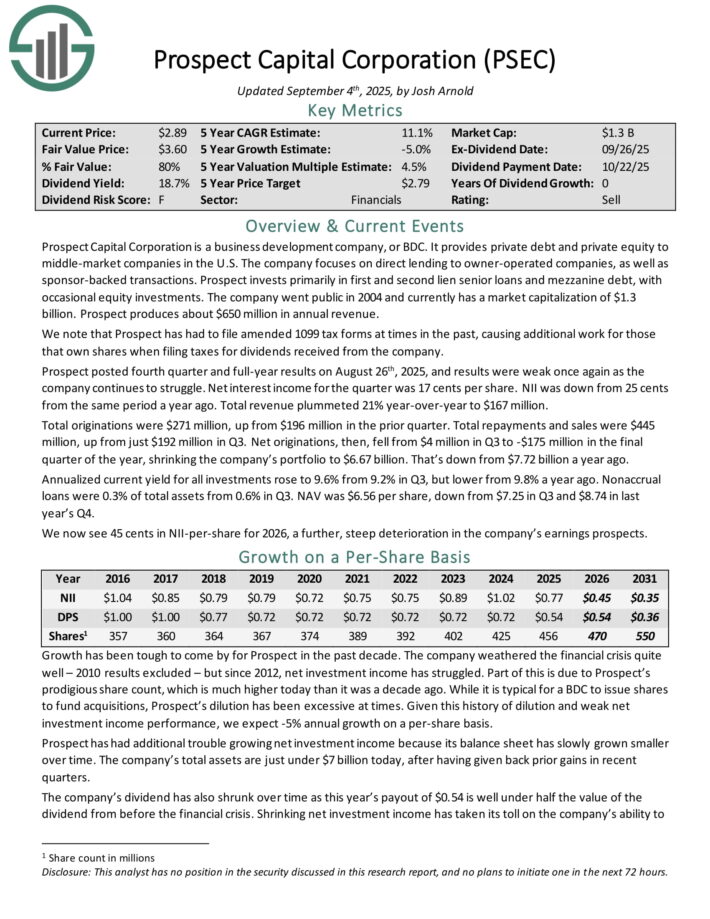
Monthly Dividend Stock #5: Horizon Technology Finance (HRZN)
5-Year Expected Total Return: 15.2%
Dividend Yield: 19.8%
Horizon Technology Finance Corp. is a BDC that provides venture capital to small and medium–sized companies in the technology, life sciences, and healthcare–IT sectors.
The company has generated attractive risk–adjusted returns through directly originated senior secured loans and additional capital appreciation through warrants.
On August 7th, 2025, Horizon announced its Q2 results for the period ending June 30th, 2025. For the quarter, total investment income fell 4.5% year-over-year to $24.5 million, primarily due to lower interest income on investments from the debt investment portfolio.
More specifically, the company’s dollar-weighted annualized yield on average debt investments in Q2 of 2025 and Q2 of 2024 was 15.8% and 15.9%, respectively.
Net investment income per share (IIS) fell to $0.28, down from $0.36 compared to Q2-2024. Net asset value (NAV) per share landed at $6.75, down from $9.12 year-over-year and $8.43 sequentially.
After paying its monthly distributions, Horizon’s undistributed spillover income as of the end of the quarter was $0.94 per share, indicating a considerable cash cushion. Management assured investors of the dividend’s stability by declaring three forward monthly dividends at a rate of $0.11.
Click here to download our most recent Sure Analysis report on HRZN (preview of page 1 of 3 shown below):

Monthly Dividend Stock #4: Gladstone Commercial (GOOD)
5-Year Expected Total Return: 15.7%
Dividend Yield: 10.9%
Gladstone Commercial Corporation is a real estate investment trust, or REIT, that specializes in single-tenant and anchored multi-tenant net leased industrial and office properties across the U.S.
The trust targets primary and secondary markets that possess favorable economic growth trends, growing populations, strong employment, and robust growth trends.
The trust’s stated goal is to pay shareholders monthly distributions, which it has done for more than 17 consecutive years. Gladstone owns over 100 properties in 24 states that are leased to about 100 unique tenants.
Gladstone posted second quarter earnings on August 7th, 2025, and results were largely in line with expectations. FFO-per-share came to 35 cents, which met estimates. Revenue was up almost 7% year-over-year to $39.5 million, beating by $1.2 million.
Operating same-store rents were up 6.4% for the six months ended in June, driven by higher property expense recovery revenue and higher rental rates. Net assets were $1.2 billion higher due to acquisitions.
Gladstone sold 2.5 million common shares, raising $38.1 million, and had $94.4 million outstanding in revolver borrowings as of the end of June. Portfolio occupancy was 98.7% as of the end of the quarter, and was 67% concentrated in industrial tenants.
Click here to download our most recent Sure Analysis report on GOOD (preview of page 1 of 3 shown below):
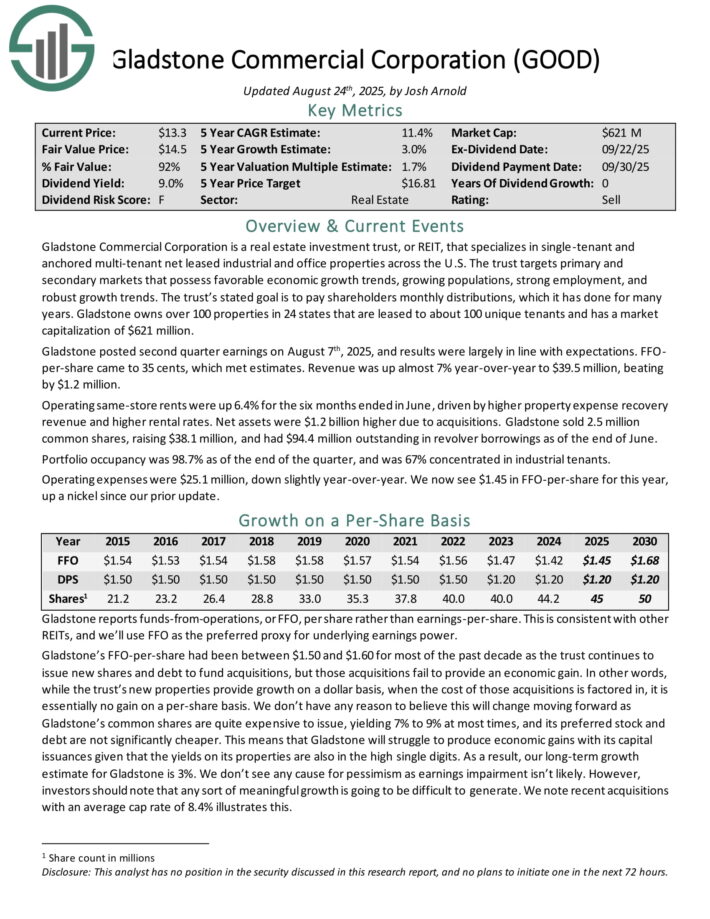
Monthly Dividend Stock #3: Healthpeak Properties (DOC)
5-Year Expected Total Return: 16.9%
Dividend Yield: 6.9%
Healthpeak Properties is the largest healthcare REIT in the U.S., with 774 properties. It was the first healthcare REIT that was included in the S&P 500.
The REIT invests in life science facilities, senior houses, and medical offices, with 97% of its portfolio based on private-pay sources. It has a market capitalization of $12 billion.
On July 24th 2025, the REIT reported second-quarter financial results. Quarterly revenue of $694.35 million was in-line with analyst estimates, and represented a year-over-year decline of 0.2%.
Adjusted funds-from-operation (FFO) was $0.46 per share, up 2.2% from the same quarter last year. Adjusted FFO-per-share was also in-line with estimates. Same-store cash net operating income growth was 3.5% for the second quarter.
Investment activity for the quarter included two new development agreements with a combined projected cost of $148 million to support Northside Hospital’s continued outpatient expansion in the Atlanta market.
Healthpeak Properties also sold one outpatient medical land parcel in June 2025 and two outpatient medical buildings in July 2025 for combined proceeds of approximately $35 million.
For 2025, Healthpeak Properties confirmed its forecast for adjusted diluted FFO-per-share to be in a range of $1.81 to $1.87. In addition, same-store cash (Adjusted) NOI growth is expected to be 3.0% to 4.0% for the full year.
Click here to download our most recent Sure Analysis report on DOC (preview of page 1 of 3 shown below):
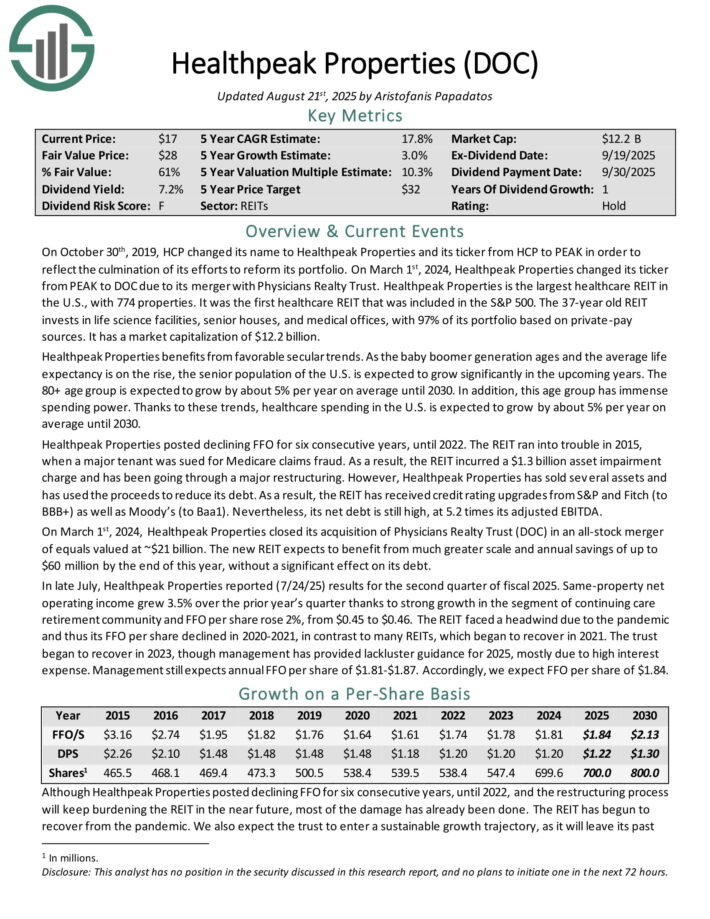
Monthly Dividend Stock #2: Dynacor Group (DNGDF)
5-Year Expected Total Return: 18.2%
Dividend Yield: 3.5%
Dynacor is a Canadian industrial gold processor with core operations in Peru, where it purchases ore from artisanal and small-scale miners and processes it at its wholly owned Veta Dorada plant in Chala.
The facility has a nameplate capacity of 430 tonnes per day and is optimized for continuous, high-efficiency throughput.
Dynacor’s model is unique in that it does not engage in exploration or mining, instead operating an extensive ore purchasing network across Peru to source high-grade feedstock.
The company operates a strong logistics network for collecting ore, runs its own labs for analysis, and handles gold exports with secure, reliable systems.
Dynacor also reinvests in expanding its supply network and enhancing plant capacity, while maintaining a lean cost structure and consistent production flow. Despite its Toronto listing, the company presents its financial statements in U.S. dollars.
On May 14th, 2025, Dynacor reported its Q1 results for the period ending March 31st, 2025. The company posted record quarterly revenue of $80.0 million, up from $67.7 million last year, an 18.2% increase driven primarily by higher average gold prices, despite a 14.9% decline in gold sales volumes due to lower ore grades.
Total gold sales amounted to 27,788 gold-equivalent ounces, down from 32,637 ounces in Q1 2024. The average selling price rose significantly to $2,878 per ounce, from $2,075 in the prior year quarter.
Click here to download our most recent Sure Analysis report on DNGDF (preview of page 1 of 3 shown below):
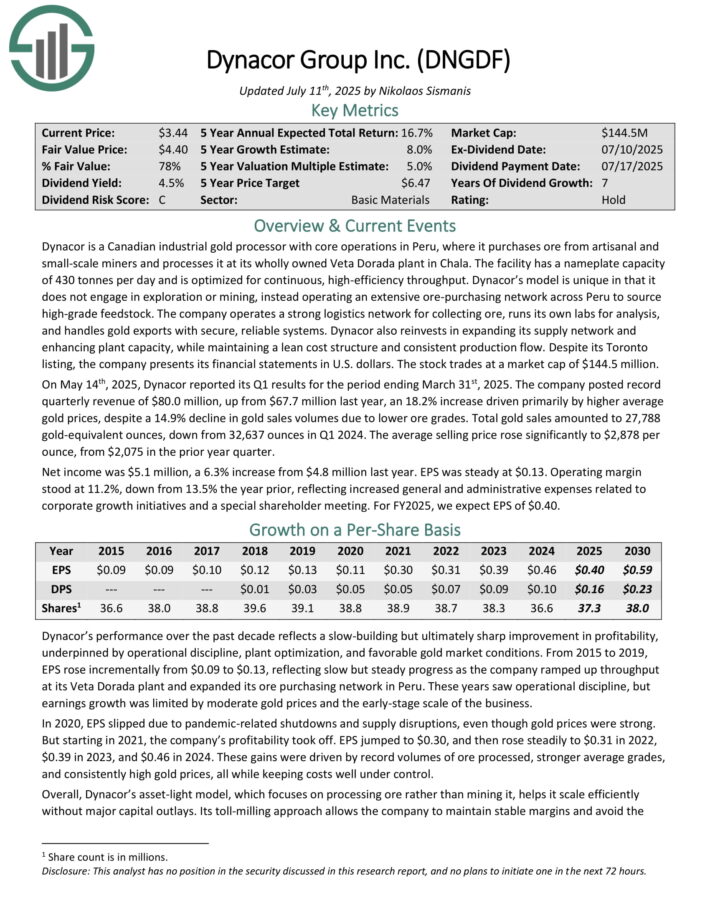
Monthly Dividend Stock #1: Ellington Credit Co. (EARN)
5-Year Expected Total Return: 20.7%
Dividend Yield: 18.4%
Ellington Credit Co. acquires, invests in, and manages residential mortgage and real estate related assets. Ellington focuses primarily on residential mortgage-backed securities, specifically those backed by a U.S. Government agency or U.S. government–sponsored enterprise.
Agency MBS are created and backed by government agencies or enterprises, while non-agency MBS are not guaranteed by the government.
On August 19th, 2025, Ellington Credit reported its first fiscal quarter results for the period ending June 30, 2025. The company generated net income of $10.2 million, or $0.27 per share.
Ellington achieved adjusted net investment income of $6.6 million in the quarter, or $0.18 per share. At quarter end, Ellington had $36.6 million in cash and cash equivalents.
Click here to download our most recent Sure Analysis report on EARN (preview of page 1 of 3 shown below):
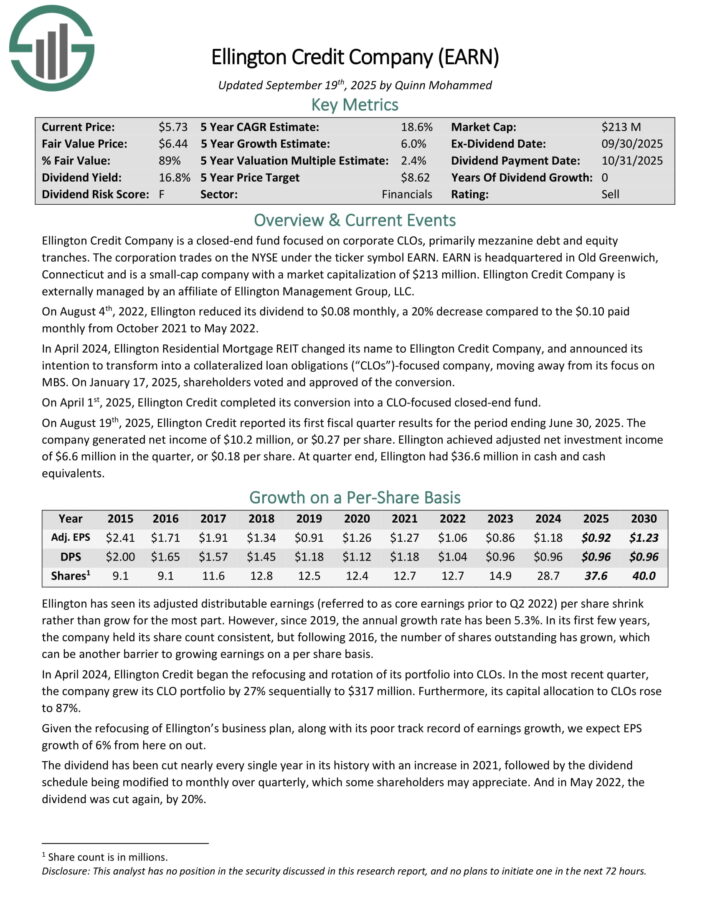
Other Monthly Dividend Stock Resources
Each separate monthly dividend stock has its own unique characteristics. The resources below will give you a better understanding of monthly dividend stock investing.
The following research reports will help you generate more monthly dividend stock investment ideas.
Monthly Dividend Stock PerformanceIn October 2025, a basket of the monthly dividend stocks above generated negative returns of -2.8%. For comparison, the Russell 2000 ETF (IWM) generated returns of 1.8% for the month.
Notes: Data for performance is from Ycharts. Canadian company performance may be in the company’s home currency.
Monthly dividend stocks under-performed the Russell 2000 last month. We will update our performance section monthly.
Why Monthly Dividends MatterMonthly dividend payments are beneficial for one group of investors in particular; retirees who rely on dividend stocks for income.
With that said, monthly dividend stocks are better under all circumstances (everything else being equal), because they allow for returns to be compounded on a more frequent basis. More frequent compounding results in better total returns, particularly over long periods of time.
Consider the following performance comparison:
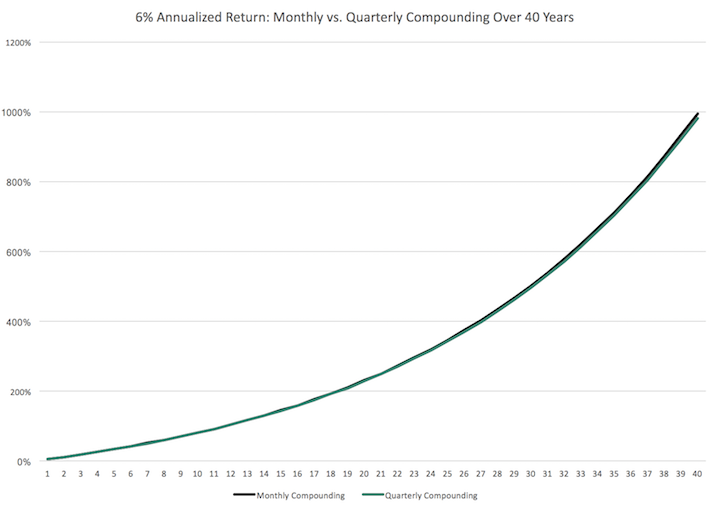
Over the long run, monthly compounding generates slightly higher returns over quarterly compounding. Every little bit helps.
With that said, it might not be practical to manually re-invest dividend payments on a monthly basis. It is more feasible to combine monthly dividend stocks with a dividend reinvestment plan to dollar cost average into your favorite dividend stocks.
The last benefit of monthly dividend stocks is that they allow investors to have – on average – more cash on hand to make opportunistic purchases. A monthly dividend payment is more likely to put cash in your account when you need it versus a quarterly dividend.
Case-in-point: Investors who bought a broad basket of stocks at the bottom of the 2008-2009 financial crisis are likely sitting on triple-digit total returns from those purchases today.
The Dangers of Investing In Monthly Dividend StocksMonthly dividend stocks have characteristics that make them appealing to do-it-yourself investors looking for a steady stream of income. Typically, these are retirees and people planning for retirement.
Investors should note many monthly dividend stocks are highly speculative. On average, monthly dividend stocks tend to have elevated payout ratios. An elevated payout ratio means there’s less margin for error to continue paying the dividend if business results suffer a temporary (or permanent) decline.
As a result, we have real concerns that many monthly dividend payers will not be able to continue paying rising dividends in the event of a recession.
Additionally, a high payout ratio means that a company is retaining little money to invest for future growth. This can lead management teams to aggressively leverage their balance sheet, fueling growth with debt. High debt and a high payout ratio is perhaps the most dangerous combination around for a potential future dividend reduction.
With that said, there are a handful of high-quality monthly dividend payers around. Chief among them is Realty Income (O). Realty Income has paid increasing dividends (on an annual basis) every year since 1994.
The Realty Income example shows that there are high-quality monthly dividend payers around, but they are the exception rather than the norm. We suggest investors do ample due diligence before buying into any monthly dividend payer.
Final Thoughts & Other Income Investing Resources
Financial freedom is achieved when your passive investment income exceeds your expenses. But the sequence and timing of your passive income investment payments can matter.
Monthly payments make matching portfolio income with expenses easier. Most personal expenses recur monthly whereas most dividend stocks pay quarterly. Investing in monthly dividend stocks matches the frequency of portfolio income payments with the normal frequency of personal expenses.
Additionally, many monthly dividend payers offer investors high yields. The combination of a monthly dividend payment and a high yield should be especially appealing to income investors.
But not all monthly dividend payers offer the safety that income investors need. A monthly dividend is better than a quarterly dividend, but not if that monthly dividend is reduced soon after you invest. The high payout ratios and shorter histories of most monthly dividend securities mean they tend to have elevated risk levels.
Because of this, we advise investors to look for high-quality monthly dividend payers with reasonable payout ratios, trading at fair or better prices.


Additionally, see the resources below for more compelling investment ideas for dividend growth stocks and/or high-yield investment securities.
Thanks for reading this article. Please send any feedback, corrections, or questions to [email protected].






















